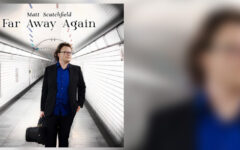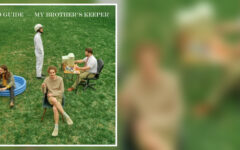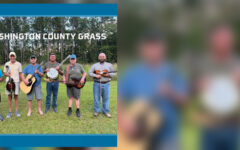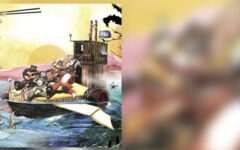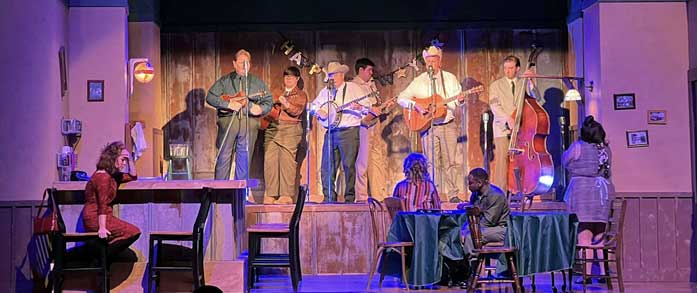
There have been plenty of events in bluegrass music history that live on as legendary, even magical, moments when the genre was changed forever. From Earl Scruggs’s debut at the Opry as a Blue Grass Boy to Carlton Haney’s first bluegrass festivals, many of these events have been studied, written about, and analyzed in depth by musicians and scholars alike.
One night not quite as scripted as these, but arguably just as impactful on the development of bluegrass, took place in 1970 when Ralph Stanley first met Ricky Skaggs and Keith Whitley. Mountain Movers Theatre Company, based in Louisa, Kentucky, is currently staging a production of When I’m Gone, a new musical by Canadian playwright Michael Ross Albert, that sets out to chronicle that night and the life-changing effects it had on all those involved. As a die-hard Stanley fan, I definitely didn’t want to miss out on the play’s recent run at the Jettie Baker Center in Clintwood, Virginia, just several miles from Stanley’s homeplace on Smith Ridge.
First things first: the music was excellent. With musical direction by Don Rigsby (who also offered a fine interpretation of both Curly Ray Cline’s fiddling and his stage presence), there was no doubt in my mind that When I’m Gone would offer up a strong sampling of Stanley classics. The musicians portraying the Clinch Mountain Boys (in addition to Rigsby, the group featured Robert Maynard as Jack Cooke and Chris Smith as Roy Lee Centers) were a top-notch band, and had obviously studied the nuances of the Stanley sound. The younger generation of musicians appearing as Keith Whitley, Ricky Skaggs, and Dwight Whitley (Andrew Rigsby, Justin Lemaster, and Gibson Davis, respectively) were also in fine form, and were certainly believable as teenage traditional bluegrass aficionados.
Danny Davis’s performance as Ralph Stanley is also of note, not just for his Stanley-style banjo skills, but for his ability to capture the sound and cadence of Stanley’s voice while both singing and talking. I’ve heard many Ralph Stanley impersonations over the years, but Davis’s portrayal was remarkable, perfectly encapsulating Stanley’s folksy, soft-spoken stage presence and his high lonesome vocals.
The play itself, on the other hand, was not quite as attention-grabbing as the music. The promotional materials for the play very obviously describe it as a dive into the story of the night Skaggs and Whitley were “discovered” by Stanley – the moment that jump-started the careers of two of the most influential modern-day bluegrass and country musicians to ever stand on stage. In reality, that event simply serves as a backdrop for the intertwined personal struggles of the characters who find themselves at a honky tonk bar in Fort Gay, WV, on New Year’s Eve. There’s an overarching theme that Stanley’s music can change lives, but instead of focusing on Skaggs and Whitley, it almost considers them an afterthought (we don’t even hear Stanley’s conversations with them, just his recap of inviting them to Coeburn to visit him the next weekend).
Instead, the audience hears from two lovers torn apart by the Vietnam War draft, an alcoholic con-man, a widow drowning her sorrows in beer and other women’s husbands, and (somewhat implausibly) Skaggs’s high school English teacher, who has traveled to the bar to stop Skaggs from throwing his life away on traveling in a bluegrass band. The main characters, the husband-and-wife bartender and waitress, work their way through his cheating and drinking, her desire to pursue a singing career, and the loss of their young son several years before the events of the play. It’s a compelling, well-written script that often has multiple storylines being acted out on stage at once, but is it truly the story of Skaggs and Whitley’s big break? Not at all.
The music is integrated into the plot, with each character in the bar taking the lead for a verse or two of a song that – sometimes more tightly than others – matches the conflicts they are facing. For instance, the soldier preparing to head to Vietnam confronts his fears of dying overseas with a solo in Pray for the Boys, while another character who regrets not being home on the day her mother died offers a touching rendition of Memories of Mother. Other songs don’t quite fit with the context of the scene around them, however, such as the lovers reuniting and sharing a tender dance to the sound of Harbor of Love.
A casual bluegrass fan may not have minded the bluegrass history being relegated to the background. However, for someone like me, who specifically attended hoping to soak in the feeling of actually being there on one of bluegrass music’s most legendary nights, When I’m Gone didn’t quite live up to expectations. I could have gladly listened to the faux Clinch Mountain Boys all evening, but I was a bit disappointed in the play as a whole.

